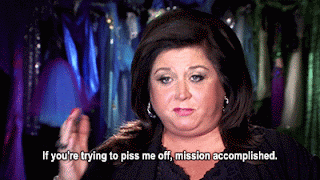Tomorrow is a big day. It's big because it's the first day, and first days are frantic and messy and long. No matter how many first days your teacher has had, it never seems to get easier. We just become better at faking it.
And, dear Baby Jesus, if your teacher-love is having their very first of the first days, you are probably already in the thick of it. There's not much you can do at this moment except hold on.
Before we delve into tomorrow, though, let's get a few things straight so that your innocent "jokes" don't become long nights on the couch or a butter knife in the back of your hand.
1. They have not been "on vacation" all summer. Most have done training and conferences and summer school. Or they have families, dear God. And even if they have been on the most magical vacation of all time, shut the heck up. They've earned it. Take me with you next time.
2. They have been back "at work" for a week or two now, but being at work with adults is a great deal easier than being back at work with 900 children. Even the worst, most annoying adults can be moved away from; children never stop following you. Shut up.
3. Stop looking at the receipts. Just stop. Setting up a classroom is like buying a new home every year. It's not just bulletin border and smelly markers they're buying. An easel pad of poster paper (50 sheets) costs $27.95. That's 10% of our yearly tax deduction we get to claim, and it's paper. Yes, it's paper that will showcase the steps to finding the area of a triangle or how to punctuate a complex sentence, but let's be real -- it's PAPER. And if you're buying the easel pad with the sticky side? Your spouse must be rich. Adopt me. I need giant sticky notes.
And if your teacher love wants to drop $11 on a pack of felt tip pens? You don't say a word.
 |
| Some girls want a bouquet of flowers. I, myself, prefer a bouquet of new felt-tipped pens. |
Your teacher-love's face will ache from smiling. The first day, we are a crowd of deranged Miss America contestants.
You smile to welcome students. You smile to alleviate parental panic. You smile to defuse parental discontent. You smile because, inevitably, s**t will fall apart. Crying child, lunch schedule mix-ups, parents who don't understand the pick-up line, or technology that worked fine today will have reverted back to 1952 tomorrow.
Tomorrow night, do not expect them to whisper sweet nothings to you. Do not expect them to ask about your day. Do not try to Face Time them. You will not want to see their face on the other end. Tomorrow is not the day to get your feelings hurt because they "seem distant". Tomorrow is a day to shut up. Maybe they'll talk again on Tuesday.
5. Don't expect them to keep up with their responsibilities at home to the usual standard. If you came to my house right now, I'd only let you in if you brought laundry detergent and a casserole. Even then, I might eye you warily through the peephole and text you instructions to leave it on the porch and walk away. They've gone from picking up after a few people (or for only themselves) to herding a school full of Pig Pens who leave a trail of pencil shavings and Axe body spray wherever they go. Think about how rage-y you get when the people in your house can't remember where dirty socks go. Now multiply that feeling times 125.
6. If your teacher-love is not in your home, consider yourself lucky. We are not a pleasant people. For the first 2 weeks, we are like zombies who have somehow retained the ability to drive. But not like the fast World War Z zombies. This is more us:
So do yourself a favor tomorrow. Give your teacher a big hug before they leave. Give them a little space when they get home. And just wait it out for a couple of days. They'll be human again someday soon.
And if not... at least you have a leg up on them.













